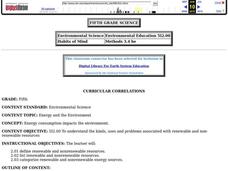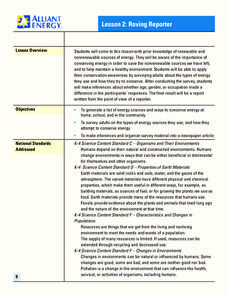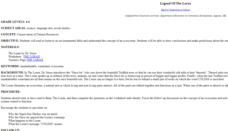Curated OER
Energy and the Environment
Fifth graders define terms associated with renewable and nonrenewable resources. They identify materials that are renewable and nonrewable. They categorize a list into the correct type of resource.
Curated OER
Class Conservation Corps (CCC)
Students investigate how the loss of soil, a valuable natural resource, affects their lives through loss of productive land to grow food, loss of coastal land mass, and poor water quality from runoff. They design a project to keep soil...
Curated OER
Roving Reporter
Students write a report about energy use. In this conservation lesson, students interview adults about their use of renewable and nonrenewable energy. Students synthesize this information and write a report from the point of view of a...
Curated OER
Watershed Investigations
Students explore the components of a watershed and the factors that affect it. They read a topographical map and use geometry to determine the area of a watershed. Students estimate the volume of a body of water and perform runoff...
Curated OER
Matter and Energy
For this matter and energy worksheet, students identify substances as solids, liquids or gases, they use the kinetic theory to describe the motion of particles and they explain the conservation of mass and energy when a substance changes...
Curated OER
Exploring for Petroleum - Modeling an Oil Reserve
Young scholars experiment with locating oil reserves. In this conservation lesson, students use a cardboard box to create sand, rocks, and an oil reserve (water balloon). They use a probe to dig around in the box to find the oil reserve...
Ask a Biologist
Desert Tortoise
The desert tortoise is a protected species, and it's population in some areas, such as Joshua Tree State Park in California, has been rapidly declining over the years. Invite your young biologists to study the Desert Tortoise...
Captain Planet Foundation
Rotting Away
What happens at the end of a plant's life cycle? Show kids the natural way that plants show that they're decomposing, as well as the importance of compost, with a lesson about living organisms. After reading Log Cabin by Anne Schreiber,...
Curated OER
Treasures in Jeopardy
In small groups, middle schoolers research deep-sea coral reefs and design a poster to educate the public about their importance. They compare them to shallow-water reefs and consider the impact of bottom-trawl fishing. Many internet...
Curated OER
Taking Action
Students use the net they make to dip macroinvertebrates at or below the surface. The flat side of the net allows pressure on the substrate so that organisms do not escape under the net. Two students hold onto the handles and submerge...
Curated OER
Legend of The Lorax
Students explore ecosystems. They read or listen to Dr. Seuss' The Lorax to draw conclusions and make predictions about the environmental impact and use of resources. They write poems about real forests and the wildlife which inhabit...
Curated OER
Biodiversity Debate - Stream Side Science
Role play community members who are both for and against the construction of a dam. Research the pros and cons and then hold a classroom debate. This activity ideally follows a series of stream studies, links to which are included. Use...
Curated OER
Iron Fertilization - Pumping Iron
The theory that adding iron to ocean water may increase phytoplankton ability to remove carbon dioxide from the atmosphere is examined. The Monterey Bay Aquarium Research Institute is monitoring conditions off the California coast to...
Carnegie Mellon University
How Power Plants Work 1
First of three lessons, this is a great start to a unit on energy. As you demonstrate, learners discover different types of energy and how it is converted from one form to another. They then focus in on the generation of electricity by...
Curated OER
Empty Oceans
In groups of four, pupils brainstorm about seafood. They view the Monterey Bay Aquarium Seafood Watch website to examine the problems caused by the seafood industry. Learners are then brought back together to discuss what they...
Curated OER
Are You Balanced With Your Environment?
Students discuss the impact of not keeping the environment in balance for future generations. As a class, they are introduced to the concept of "Balance of Nature" and what it means. In groups, they research the role of trees and how to...
Curated OER
Splendid China
Sixth graders gain an appreciation for the traditions and vast contributions of the Chinese culture in this unit of lessons.
Curated OER
Describing Chemical Reactions
For this chemical reactions worksheet, students fill in 12 blanks with the appropriate terms related to chemical reactions. They also indicate if 4 statements are true or false and match 7 words with their descriptions. Students complete...
Curated OER
Utilizing Community Resources
Students gain an understanding of scientific methods and use process skills (such as observing, classifying, and predicting) to solve a problem. They develop an understanding of the need for natural preservation.
Curated OER
What If We Run Out?
Students explore the consequences of shrinking habitats and the human impact on wildlife populations. They participate in a game to study the consequences and describe the preservation of animal habitats.
Curated OER
Everyday vs. Extreme Relationships with Nature
Students examine the interactions with nature and the environment. They discover where water comes from and ways to conserve water. They also examine energy sources and consumption.
Curated OER
Terrestrial Communities
Students watch a video about different terrestrial communities. They conduct an experiment with sponges conserving water. They research desert characteristics comparing them with other biomes.
Curated OER
LEAGUE: Into the Desert: Lesson 1
Learners discover the human and physical characteristics of desert regions. In this regions lesson, students describe deserts around the world, discuss animals, vegetation, water conservation, and how humans can care for the land.
Curated OER
Celebrating Earth Day
Students explore environmental safety by planting seeds outside their classroom. In this Earth Day lesson, students identify the different ways to recycle and conserve resources on Earth while facilitating recycling bins around campus....























